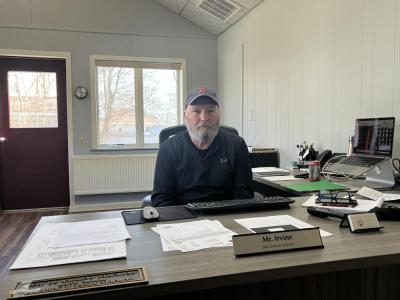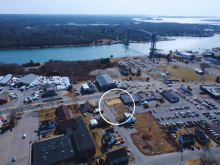Tabor Academy oil spill ignites search for mysterious tank
MARION — When plumbers first entered the basement of Tabor Academy’s Lillard Hall on Wednesday, Jan. 8, the first thing they noticed was the smell. A rich, greasy scent emanated from the ground where they could see the wetness of the basement already mixing with spilled oil.
The plumbers, just there for a standard drain clearing, immediately notified Tabor Academy Facilities Director Joseph Irvine about the ongoing oil leak they discovered.
Irvine contacted the Marion Fire Department, the Massachusetts Department of Environmental Protection, the Marion Health Department and the harbormaster for further assistance.
It was deduced that the leaking oil is possibly coming from an oil tank buried beneath the basement that the academy did not know existed prior to the spill.
Lillard Hall, which is used as a dormitory, dining hall and faculty housing area, was unaffected besides the basement area which is not open to the public.
The Marion Board of Health referred to the situation as “rather odd” due to unusual placement of the potential tank underneath a building and the fact that Tabor did not know that the tank existed prior to the leak.
The board of health also reported that the academy attempted to use thermal scanning to locate a tank but it was ineffective due to the layers of cement and rebar that blocked the scanner.
Frank Corp. from New Bedford has been assisting in cleaning up the leaking oil in addition to Irvine consulting with Civil and Environment Consultants to set up drilling and testing to determine the actual location of the possible tank.
Irvine confirmed that the amount of oil leaking has significantly decreased since January.
“It’s a very small leak,” said Irvine. “We’re talking like ounces over the last month, not gallons.”
The in-depth search for the possible oil tank will begin on Monday, March 10 during Tabor’s spring break.
Irvine stated that it may not even be the tank causing the issue but they will not have full confirmation until they begin drilling.
Irvine says it’s “hard to say” when the cleanup will be finished due to the numerous steps it takes to fully relieve the area of the oil and the mystery of where the potential tank is actually located.
“It may be as simple as we put in test areas and then we just monitor it for a period of time until the Department of Environmental Protection is satisfied with what’s going on or we could end up having to take the tank out and dig it up,” said Irvine. “We don’t know any of that yet.”
















